De Duitse dichter en schrijver Julius Waldemar Grosse werd geboren op 25 april 1828 in ErfurtZie ook alle tags voor Julius Grosse op dit blog.
Armut der Weisheit
Ihr alten Bücher, glänzend noch bei Nacht
In Gold und Leder und voll weiser Lehren –
Ihr redet mir von einst’ger Kaiserpracht,
Bringt Platon, Sirach, Epikur zu Ehren.
Ihr baut mir eine Welt aus euren Blättern,
Und Geister steigen auf aus euren Lettern.
Ach, ich ersehne nur im Mondenschein
Ein lebend Herz, und eure Geister machen
Mich bitter fühlen, daß ich bin allein,
Fern der Geliebten, fern dem holden Lachen
Des Mädchenmunds – o Plato, Epikur,
Dagegen seid ihr arme Schelme nur.
Ewige Jugend
Wohl alle Tage, wenn ich bei dir bin,
Umschleiert mich ein Frühling ew’gen Lebens
Und ewiger Jugend. Jahre fließen hin;
Dein Zaubertrank, ich trank ihn nicht vergebens.
Und wenn du morgen welktest bleich und krank,
Die schöne Stirn gefurcht von Gram und Sorgen,
Mein Auge ist gefeit von jenem Trank,
Das Leben mir ein ew’ger Hochzeitmorgen.
Und wandelst du dereinst mit greisen Frau’n,
Müd’ und gebeugt in silberweißem Haare;
Ich bin geweiht, dich stets als Braut zu schau’n,
Ohnmächtig überfluten uns die Jahre. –
Ja, wie der Wein, der alt an Glut gewann,
So glüht der Zauber mächt’ger mit den Zeiten.
Du kannst nicht altern. Was ein Gott begann,
Wird göttlich dauern in die Ewigkeiten.
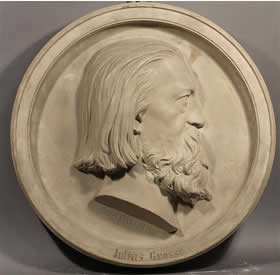
Julius Grosse (25 april 1828 – 9 mei 1902)
Portret op een medaillon door Ernst Julius Hähnel, 1879
De Duitse dichter en schrijver Richard Anders werd geboren op 25 april 1928 in Ortelsburg, tegenwoordig Szczytno, Polen. Zie ook alle tags voor Richard Anders op dit blog.
Verschwunden
Mal bist du dir voraus – mal rennst du hinter dir her und siehst deinen
mit jeder Sekunde kleiner werdenden Rücken. Die Straße führt zum
Horizont, wo die Häuser nur Punkte sind. Plötzlich bist du verschwunden,
bist unerreichbar geworden. Du drehst dich um. Jemand läuft auf dich zu.
Du! Du fliehst. Erst jetzt läufst du mit der Geschwindigkeit, mit der du dich,
als du hinter dir her warst, hättest erreichen können. Doch diesmal ist es
nicht Spiel oder Ernst. Den Augen deines Verfolgers entronnen, bist du
auch – bis auf diese lesbare heiße Spur – dir selbst abhanden gekommen.
Sturz
Du öffnest das Fenster. Obwohl es heller Tag ist, siehst du in tiefe
Schwärze. Dennoch springst du, wie du es dir vorgenommen hast.
Ein Blitz erschreckt dich: Hinter deinem Rücken zerflammt dein Haus.
Die Schwärze scheint sich im Sturz zu verdichten, bis sie dich schwerelos
wie eine Mauer umschließt. Stand dein Haus in den Sternen? Gäbe es noch
Dämmerung, dämmerte es dir, daß springend du deinen Kopf nicht verlassen hast.
Und du wirst ihn nie verlassen wegen deiner, im Vergleich zum Kopf
unendlichen Kleinheit, die dich zu Lebzeiten nicht den furchtbaren Aufschlag,
das Zersplittern aller Knochen erleben läßt.
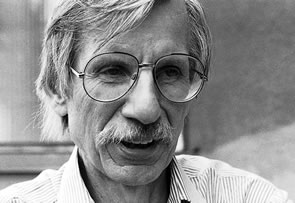
Richard Anders (25 april 1928 – 24 juni 2014)
De Spaanse schrijver Leopoldo Alas (wereldwijd bekend als ‘Clarín’) werd geboren op 25 april 1852 in Zamora. Zie ook alle tags voor Leopoldo Alas op dit blog.
Uit: La Regenta (Vertaald door Robert M. Fedorchek)
“This did not prevent him from sighing when he noticed that Diego [the son] had adopted ideas, habits, and tendencies that were a far cry from the Castilian simplicity that for Don Juan constituted good manners and character. Their son looked more like the duchess than the duke, and the education that he called rigid, proper, and cold accentuated the differences between them, differences that Don Juan sincerely regretted. But the duke did not complain. To each his own, he believed. Neither Diego nor anyone else would change his ways now, but his successor, well…let him become what God had ordained. Don Juan had demanded freedom for himself, and he allowed others to live as they wished. One thing, however, was clear: while the old duke was alive, his house, no matter how annoyed the young master appeared to be, would bend to his will.
Diego, as a matter of fact, felt an insuperable repugnance for his father’s ways. He, who had had student servants, who from his time at the boarding school had learned to measure the distances that reality out of necessity establishes between different classes, even saw a kind of hypocrisy, or at least a ridiculous illusion, in bad taste, in this apparent equality of treatment which did not go beyond the surface, which could only be skin-deep. All of this, he thought, is a grotesque comedy that annoys the rest of us and would humiliate the poor peasants themselves if they were more sensitive. »
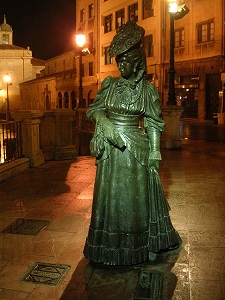
Leopoldo Alas (25 april 1852 – 13 juni 1901)
Standbeeld van La Regenta in Oviedo
De Duitse dichter en schrijver Sigmund von Birken werd geboren op 25 april 1626 in Wildstein nabij Eger. Zie ook alle tags voor Sigmund von Birken op dit blog.
Sonntags-Abend-Lied
Nach der Singweise: Die helle Sonn ist nun dahin usw.
1.
Die liebe Sonne weicht von hier,
Der Tag verjagt die Nacht.
Hirt Israels! du bist bey mir,
Ich traue deiner Wacht.
2.
Gehst du mir auf, du ewigs Liecht,
So hab ich Sonnenschein.
Bist du bey mir, so werd ich nicht
Im Hertzen finster seyn.
3.
Fürcht, meine Seele! nur kein Leid:
Dein Liecht schon tritt herzu.
Bey dir die Sonn einkehret heut,
Ist deiner Ruhe Ruh.
4.
Nacht, gute Nacht, mach dich davon!
Mein Tag mich dannoch grüst.
Ja, meine Sonn ist Gottes Sohn,
Mein Liecht heist Jesus Christ.
5.
Ob Sünden-Nacht dazwischen steht,
Raubt mir den Sonnenschein:
Durch seines Blutes Morgenröth
Soll sie zertrieben seyn.
6.
Geh schlaffen, Leib, und ruhe wol,
Dich schutzt der Engel wacht.
Die Sonn gesund dich wecken soll,
Wol sag ich: gute Nacht!
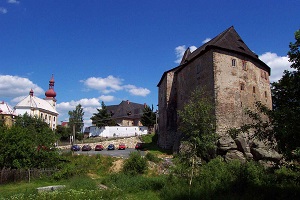
Sigmund von Birken (25 april 1626 – 21 juni 1681)
Wildstein met burcht
De Tsjechische dichter en vertaler Jindřich Hořejší werd geboren op 25 april 1886 in Praag. Zie ook alle tags voor Jindřich Hořejší op dit blog.
Uit: Jaroslav Hasek, le brave soldat Chvéïk (vertaling Jindřich Hořejší)
« — Mais, M’sieur le patron, c’est l’archiduc Ferdinand, celui de Konopiste, le gros calotin, vous savez bien ?
— Jésus-Marie, n’en v’là d’une nouvelle ! s’écria Chvéïk. Et où est-ce que ça lui est arrivé, à l’archiduc, voyons ?
— À Saraïévo. Des coups de revolver. Il y était allé avec son archiduchesse en auto.
— Ça, par exemple ! Ben oui, en auto… Vous voyez ce qu‘c’est, M’ame Muller, on s’achète une auto et on ne pense pas à la fin… Un déplacement, ça peut toujours mal finir, même pour un seigneur comme l’archiduc… Et surtout à Saraïévo ! C’est en Bosnie, vous savez, M’ame Muller, et il n’y a que les Turcs qui sont capables de faire un sale coup pareil. On n’aurait pas dû leur prendre la Bosnie et l’Herzégovine, voilà tout. Ils se vengent à présent. Alors, notre bon archiduc est monté au ciel, M’ame Muller ? Ça n’a pas traîné, vrai ! Et a-t-il rendu son âme en tout repos, ou bien a-t-il beaucoup souffert à sa dernière heure ?
— Il a été fait en cinq sec, M’sieur le patron. Pensez donc, un revolver, ce n’est pas un jouet d’enfant. Il y a pas longtemps, chez nous, à Nusle, un monsieur a joué avec un revolver et il a tué toute sa famille, y compris le concierge qui est monté au troisième pour voir ce qui se passait.”
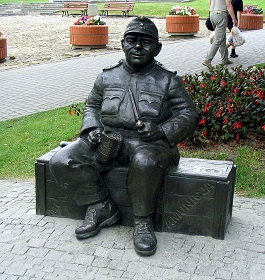
Jindřich Hořejší (25 april 1886 – 30 mei 1941)
Standbeeld van de brave soldaat Švejk in Przemyśl, Polen
De Engelse essayist en diplomaat Sir William Temple werd geboren in Londen op 25 april 1628. Zie ook alle tags voor Willam Temple op dit blog.
Uit: Observations upon the United Provinces of the Netherlands
“Upon these Foundations was this State first establisht, and by these Orders maintained, till the death of the last Prince of Orange; When by the great influence of the Province of Holland amongst the rest, the Authority of the Princes came to be shared among the several Magistracies of the State; Those of the Cities assumed the last nomination of their several Magistrates;
The States-Provincial, the disposal of all Military Commands in those Troops which their share was to pay; And the StatesGeneral, the Command of the Armies, by Officers of their own appointment, substituted and changed at their will. No power remain’d to pardon what was once condemned by rigor of Law; Nor any person to represent the Port and Dignity of a Soveraign · State; Both which could not fail of being sensibly missed by the people, since no man in particular can be secure of offending, or would therefore absolutely despair of impunity himself, though he would have others do so; And men are generally pleased with the Pomp and Splendor of a Government, not only as it is an amusement for idle people, but as it is a mark of the Greatness, Honour and Riches of their Countrey.
However these Defects were for near Twenty years supplied in some measure, and this Frame supported by the great Authority and Riches of the Province of Holland, which drew a sort of dependance from the other Six; and by the great Sufficiency, Integrity and Constancy of their chief Minister, and by the effect of both in the prosperous Successes of their Affairs:
Yet having a Constitution strained against the current vein and humour of the people, It was always evident, that upon the growth of this young Prince, The great Virtues and Qualities he derived from the mixture of such Royal and such Princely Blood, could not fail in time of raising His Authority to equal at least, if not to surpass that of his glorious Ancestors.”
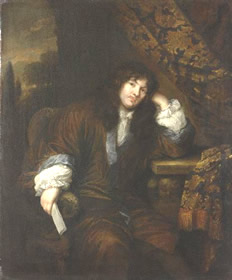
William Temple (25 april 1628 – 27 januari 1699)
Portret door Gaspar Netscher, 1675
